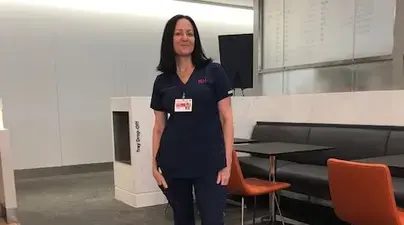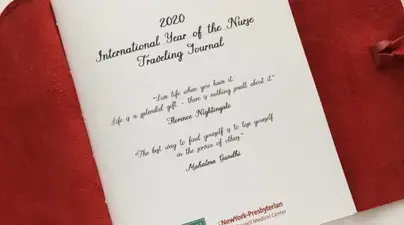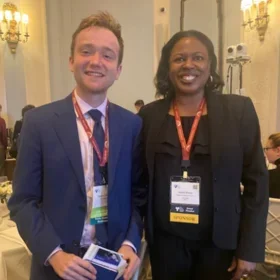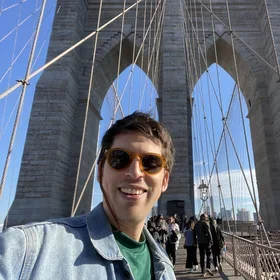As a clinical nurse at New York-Presbyterian Hospital in Manhattan, Sabrina Anastasio, ‘20SPS, has witnessed the profound isolation so many have suffered during the course of the global COVID-19 pandemic. “There’s no family allowed here,” she said. “Nurses become stand-ins for loved ones.”
Bearing witness, Anastasio added, often brings its own burden of loneliness and isolation for so many nurses and medical professionals, including a colleague she recently tried to comfort. “I told her, ‘You’re doing everything right. You’re there, you’re making a difference, you’re doing your job,’” she recalled. “‘You just have to figure out what to do with that experience.’ That’s the question: How do we process this?”
For Anastasio, the answer has been narrative medicine — or, more precisely, “narrative nursing.” Drawing on her experience in the Certification of Professional Achievement in Narrative Medicine program at Columbia, she is encouraging her fellow nurses to use storytelling, poetry, and other acts of creativity to make their own mark in this unprecedented and historic time.
Anastasio came relatively late to nursing, at age 47, after practicing for 20 years as a licensed massage therapist. But she’s been a storyteller all her life, having grown up in Brooklyn in a large Italian-American family of natural raconteurs. “I could sit there and listen to my grandfather tell stories for days,” she said. “I think that’s why I’ve always loved working with the geriatric community.”
When she first encountered Narrative Medicine a year ago, through an introductory workshop from the University’s Division of Narrative Medicine entitled “Burnout in Healthcare: The Need for Narrative,” Anastasio felt she had found her tribe. The idea of using writing and other creative practices to foster improved communication and emotional health resonated with her long-standing dedication to holistic care. And now living with a genetic kidney disease that surfaced when she turned 50, she has a built-in affinity with her patients.

After recently completing her third semester of the C.P.A. program, Anastasio formulated her own definition of Narrative Medicine: “Communicative methods used to establish empathetic tendencies, promoting personal and professional development. Narrative medicine improves listening skills that can be implemented in any patient-care setting, creating safe and encouraging environments to collect significant data and stimulate healing.”
The need for these communicative methods and listening skills became all the more urgent for Anastasio back in March, when New York City became the epicenter of the pandemic in the United States. She recalled learning about new social distancing protocols from Rosanne Raso, her Chief Nursing Officer at New York Presbyterian/Weill Cornell Medical Center and wondering how she would be able to do her job. “Now I can’t touch people?” she said. “I am a nurse, and then you're gonna cut my hands off? How am I going to communicate with my patients?”
For Anastasio, with many years of experience in holistic practice, she considered hands an extension of her ability to communicate when words don’t come easily.
Her first response was to write a poem. She shared it with her CNO, who then approved her proposal to compile a journal of stories, poems, drawings, and other creative contributions from their colleagues. The resulting work-in-progress is called The Traveling Journal in reference to the World Health Organization’s timely decision to designate 2020 as the “International Year of the Nurse and Midwife,” in celebration of the 200th anniversary of Florence Nightingale’s birth.

The leather-bound 8” x 10” book (handmade by an artisan on Etsy) has been traveling within the hospital, collecting entries from all nurses. “The goal is for this book to be like a mascot —it can go with nurses to celebratory events,” Anastasio said. “Maybe make it into the Weill Cornell Medical library, like a time capsule. This is already a serious part of history in the making.”
Apart from promoting greater awareness of Narrative Medicine, Anastasio hopes the journaling project can also combine the qualitative, subjective data from the entries with quantifiable, empirical data in order to show its clinical value, as well. But with the pandemic still very much a persistent, present threat, she hopes The Year of the Nurse can help to rally nurses everywhere to rise to the challenge of the moment with the fierceness she demonstrates in one of her own entries, written on her birthday, March 21:
Dear Corona, just a birthday wish. Please don’t count us out…. I trust you know that we are a relentless bunch of humans. And even though you have kicked us where it hurts, we will rise above the fear and, most importantly, learn to love and respect one another…. I also wish everyone finds the right words to express their feelings and embrace love personally, professionally, and globally. Viruses like you die out eventually, but until you do so, give us a minute to catch you.
Till then, killing you with kindness. We shall overcome.
Love, a nurse,
Sabrina.
Learn more about the Online Certification of Professional Achievement in Narrative Medicine program.


